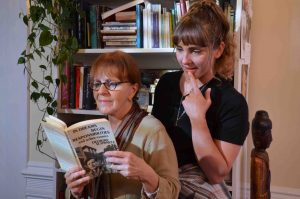Theater Review / “Collected Stories”
Another tour-de-force from The Fringe
By Joanna Brady
I just loved this play, which opened Jan. 22 at the Woman’s Club to an appreciative audience. The acting is superb, the language is literary, the social commentary interesting, and the story is thought-provoking. It’s also laced with some very funny lines.
No, it’s not a series of very short fiction pieces, which you might infer from the title, “Collected Stories”. Rather, this tightly focused play, written by Pulitzer prize winner Donald Margulies in 1996, is about Ruth Steiner, a writer of short stories at the back end of her career, and Lisa Morrison, a beautiful young graduate student who becomes her protégée. “Collected Stories” has been produced internationally, and has garnered a flock of awards, from L.A. (where it first played), to Broadway, to the U.K. where the role of Ruth Steiner was played by Helen Mirren.
“Collected Stories” is about a powerful friendship. It features just the two characters in conversation, some of it endearing, some of it problematic and confrontational. It is set in New York, in Steiner’s apartment—the Woman’s Club is the perfect venue for this.
Margulies delves into some deep psychological themes here, and he is canny and adept when he works out the conflict at the core of the play. Ruth Steiner, brilliantly played by Glenda Donovan, is a professor and respected short story writer. Ruth has achieved a modicum of success in the past, enough to keep her teaching and living in a cozy New York apartment.
Her student and protégée is a talented ingénue, Lisa Morrison, a bright grad student; an eager young talent who wants to emulate and eventually, overtake, her mentor. She is self-absorbed, ambitious, and literary—despite her Valley Girl way of speaking. In the beginning Lisa idolizes Ruth and over a period of several years, there’s a Pygmalian element to the relationship. Civil and friendly at first, evolving into a mother/daughter kind of affection.
Though we come to love Ruth’s feisty, proudly Jewish, earthy character, she is not immediately likeable. Wary and aloof, she avoids people, and is dismissive about her students. She is slow to accept Lisa’s puppy dog enthusiasm, but eventually she takes a liking to her, and offers her a job as her assistant. Although Ruth is unstinting in her critiques of Lisa’s work—bordering on bullying—they become friends, and Ruth guilelessly confides her secrets to her protégée. An affair she once had with poet and short story writer Delmore Schwartz, is revealed, and Lisa jumps all over it.
Throughout the years, Lisa morphs from insecure student to a successful writer, and their friendship, while fading, remains intact. It is only after Lisa gets a collection of short stories published that things begin to change. Her short stories explored her own familiar suburban world, but as a published writer, she feels she must grow beyond her narcissistic cocoon. When she writes a revealing novel based on Ruth’s affair, it leads to the crux of the play, when the women deal with the question of whether a creative person can borrow the life of someone else to include in their own creative work. A debate of ethics vs aesthetics. The core question becomes: when writers pen stories about someone, does it become their story, or does the story belong to the subject of the story?
It’s done all the time—after all, writers have to glean their material from somewhere. But when a friend lays bare private secrets in confidence, secrets that could make them seem tawdry or shameful, it is seen as a betrayal. An unforgivable one, as it turns out.
In the course of the play, Ruth tells Lisa, “Writers must rummage everywhere for ideas.” She tells her not to dither about the ethics of writing, “just write it.” and “you can’t worry about what other people think.” Advice that all comes back to bite her in the keister.
“Collected Stories” is superbly directed by Annie Miners who manages to bring out the best of the talents of both members of the cast, wringing out emotion without allowing the play to become maudlin or over-acted.
This play is a delight to watch. Don’t miss it!
Showing from Jan 22-Feb. 2 at The Woman’s Club, 319 Duval St. Limited seating. Curtains at 7:00 p.m. Advance tickets suggested. Get yours today. Fringetheater.org 305 731-0581 For further information go to info@fringthetheater.org
(Joanna Brady is a local writer, author of the historical Key West novel, The Woman at the Light, published by St. Martin’s Press)
[livemarket market_name="KONK Life LiveMarket" limit=3 category=“” show_signup=0 show_more=0]


No Comment